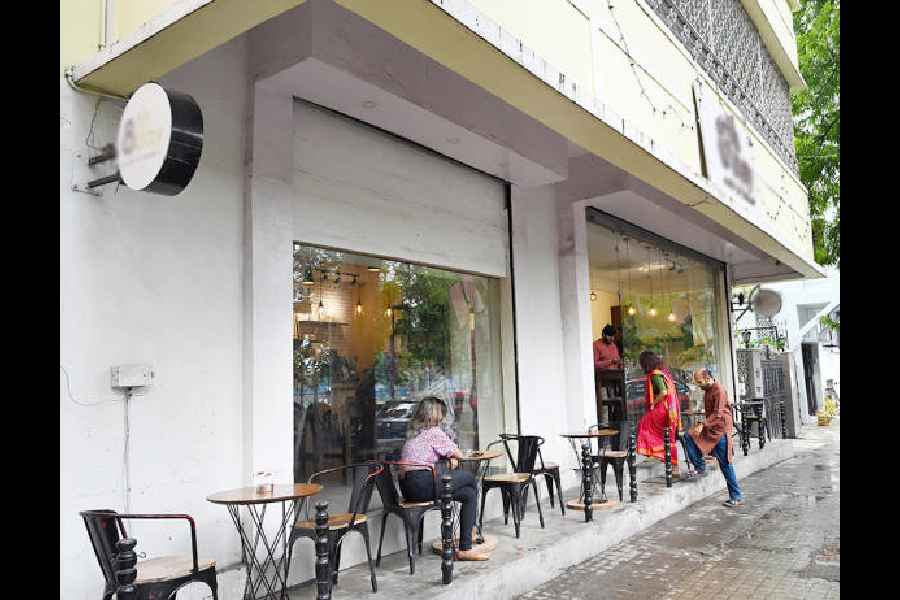The sight of them in clusters will remind you of the rash of wild flowers — ghentu, bon tulsi, kurchi — peeping out of clumps of green by the wayside. Red and purple, yellow and white, stippled and freckled like Hopkins’ poetry.
South Calcutta is suddenly aflower with coffee shops. Book cafés, specialty cafés, music cafés, heritage cafés, franchisees of foreign chains, retro cafes, those with pet corners...
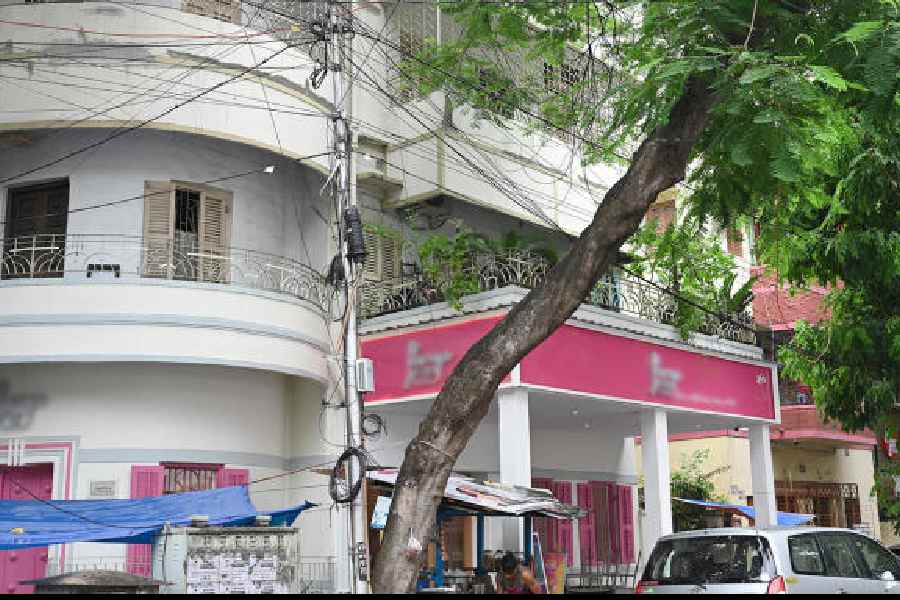
Coffee shop. Pic by Pradip Sanyal
Sombre residential paras full of houses built at the turn of the 20th century with names such as Anitaloy, Anandabhaban, Shyamali, Manjula, Abashar, long emptied of newer generations of occupants, now mere objects of lust of a dime-a-dozen realtors, are suddenly awake and come alive to the smell of coffee.
A portion of these houses or their neighbours — usually the ground floor or a part of it — has turned coffee shop. Little places, big places, nondescript places, boutique places, aantel places, elite places…
The distance between Flurys on Lake View Road and L’Instant Coffee is all of 54 modest strides. About 250 steps away is café Drifter. On the other side of the road is Rao’s Udipi Home and Coffee n Mood. Turn a corner and there is a café in pastel green called Poach. Keep walking and after about 100 steps, turn left and you will be upon Loafer’s Cafe. Someone should have done a quarterly printed coffee shop map, if only for the heck of it.
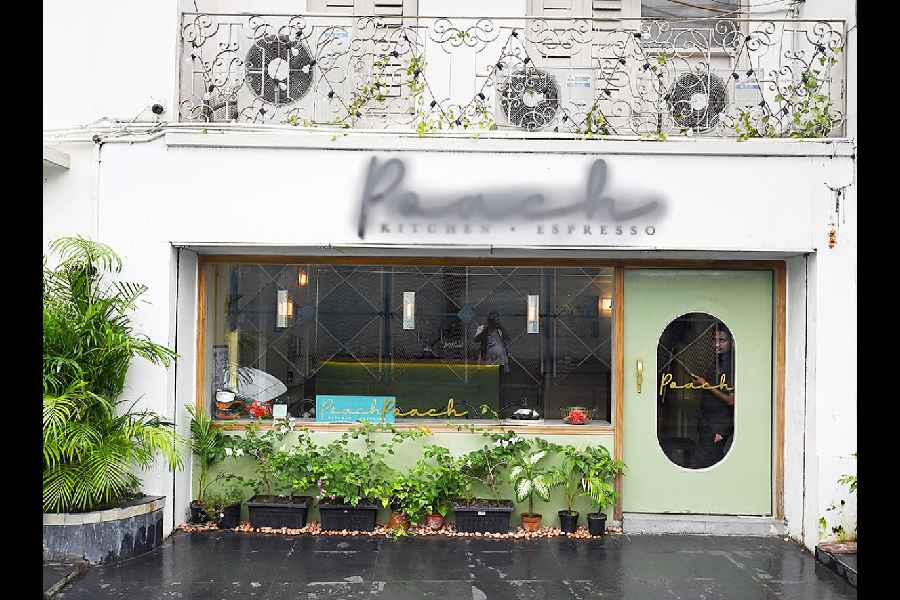
Coffee shop in a Calcutta neighbourhood
Sarat Bose Road is a cluster, Jatin Bagchi Road is another, so also the Southern Avenue stretch. Dive into any of the lanes in and around these places and you will come across more — Wise Owl, Armaan’s Cafe, Garden Cafe, Potboiler Coffee House. While the immediate orbit of the Lakes is definitely the steamin’ coffee circuit, there are coffee shops in Ballygunge and Jodhpur Park. Abar Baithak, Steamin Mugs...
Nishant Sinha, founder-owner of Roastery Coffee House, says when he opened his shop, the names that were most bandied about were Sienna Café and 8th Day. That was 2019. These days, social media legend has it that there are 250 coffee shops in and around Southern Avenue alone.
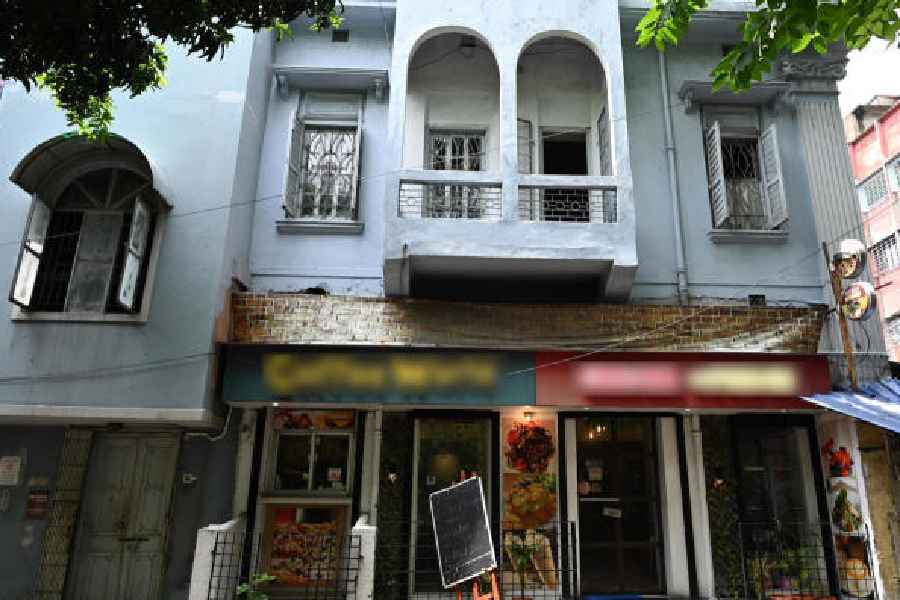
Coffee shop in a Calcutta neighbourhood
Roastery is on the ground floor of the Calcutta South India Club whose first president was C.V. Raman. If you are in the outdoor seating area you might notice the long-necked fan on the covered verandah of the first floor and the wall clock. Not far away, on Southern Avenue, Sonika Dey has just opened the 200-seater Bunaphile in what used to be a Durga Mandir.
It is as if these art deco buildings with their curved verandahs, grilles with motifs and slatted windows made a dash through a time portal and only one part made it. That would explain why the portion of Charu Kutir that houses Flurys has fuschia doors and windows while the rest of it has the pallor of someone who has just seen a ghost. At dusk, these coffee shops are aglow with people — unlike the nail parlours, boutiques and restaurants.
There is a pattern to these coffee gullies. For every three coffee shops, there is a tea shop at the end of a gully; smart, small, without frills. Ritu and Manish, owners of one such place ShareChai on Southern Avenue, say chai drinkers are dead serious about their tipple. Coffee drinkers, on the other hand, imagine themselves to be Ulyssean figures, in pursuit of an idea of a beverage.
That is not to say that the actual thing is not quality. Nikhil Chawla of Poach and Marbella’s, a coffee man for 15 years, will tell you that these days it is difficult to serve bad coffee. Good machines are easy to get — mostly from Italy — and affordable. Beans are in plenty too. In most coffee shops of the city, 75 per cent of the beans is India-grown, and places like Café Kathmandu serving only single-origin Arabica from Nepal are the exception.
Of course, not every coffee shop is viable business, some are used to “rotate money”, but broadly speaking, coffee shop owners know what they are doing. Besides peddling the “healthy” Arabica, Varsha Singh Sondhi, co-owner of Café Kathmandu, offers barista training courses; she has also “trained” many coffee-shop owners. The evolving experimental menu excites Sonika. She talks about her British Paturi with Ghee Rice and also about leveraging the heritage of the space she is in. “Customers video call friends and family to show they are at poet Nabanita Deb Sen’s house... I have now got permission to host readings of her works at Bunaphile Hindustan Park.” Nishant’s Roastery brand manufactures “specialty coffee”.
This wave of coffee shops is different from the India Coffee Houses of the last century, and from the CCD, Costa and Barista wave from the turn of this century. These coffee shop frequenters are also a different species.
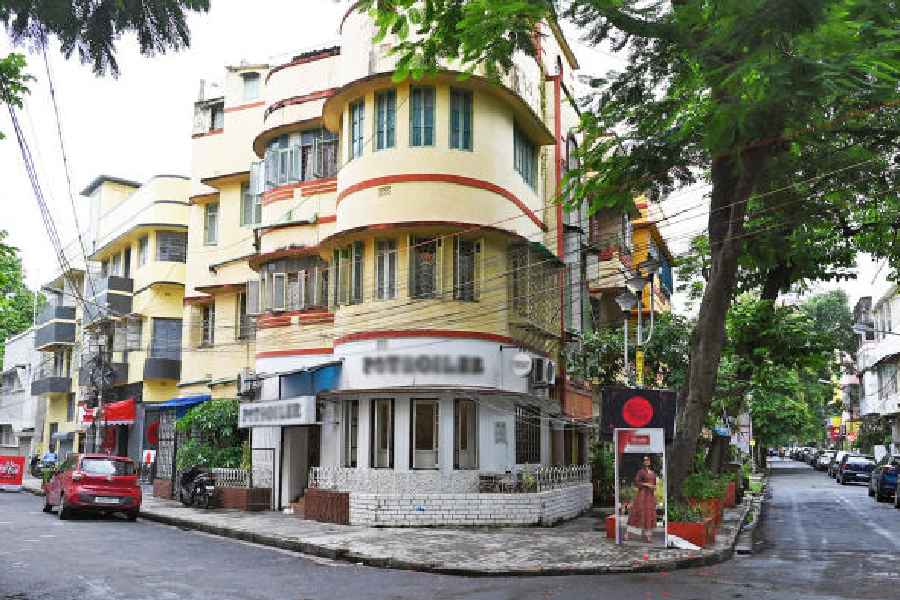
Coffee shop in a Calcutta neighbourhood
Ami Dave, 27, talks about the coffee shop as “a free, fluid, photogenic space”. Tanima Biswas, 39, says she loves the food — “mini cupcakes, pizzas, burgers”. Pushpanjali, 47, said, “I walk a lot. If I see a new cafe that looks interesting or has an interesting name — Blue Magpie, Golpo Gujab, whatever — I try it out.” Nearly everyone applauds the fact that coffee shops almost never rush the customer. Only Tauhid Khan, 26, says that for the last six months, he has been running up an expense tab of 2,000 bucks a month on the Coffee on Cocoa drink at Blue Tokai. He says, “Every third day I find myself there.” Ami says, “I once saw a couple meeting for the first time after they had matched on Tinder. I had fun eavesdropping.” More than one person said they had seen LGBTQ clubs meet here.
At 3pm on a weekday, on the first floor of a coffee shop on Purna Das Road, there are only female customers. Two adolescents in ripped shorts facing each other, wordlessly tucking into first fries, then a pizza, then dim sums. They are drinking mojitos. At another table, two 30-somethings are talking loudly in Bengali, about their mothers. There are 25 women between the two rooms, all of them are wearing Western casuals, carrying handbags in baby pink or glossy white or a floral print. Animated discussions, but no one saying “Manipur” or “Gurgaon”, “uniform civil code” or “panchayat polls”, “fuehrer” or “fascism”.
Friday, 7pm, another coffee shop. Three single people, three duos, two couples with young kids in tow, and four large groups. Apart from the two families, nearly everyone is wearing sneakers — turquoise, purple, white... Everyone knows how to scan menus. The single man with the umbrella for company asks for a “Cascara”; a woman in a sari — there are only three of them in saris — wants to know if they have soy milk. The facing house has elaborate grilled windows. From behind one, a lone gamchha hanging from a short clothesline watches.
A lot seems to be happening over coffee.

